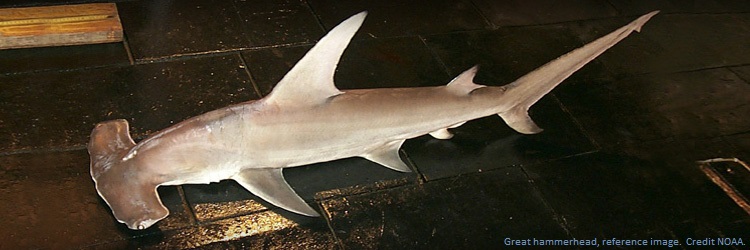Catch and release with care: shark-friendly fishing practices
As you enjoy recreational fishing this summer, please remember to handle and release protected fish species with care to help them recover and survive.
One adult male and three adult female great hammerhead sharks – a protected species in Florida – washed ashore dead in late June through July in Sarasota County. Members of the public notified Mote Marine Laboratory, an independent research institution in Sarasota, and the Florida Fish and Wildlife Conservation Commission (FWC), the state wildlife agency. One female shark had fishing gear on it, and the male shark was reported by the angler who caught, released and later found it dead.
It is illegal to possess great hammerheads in Florida but legal to catch and release them. Even so, hammerheads are especially vulnerable to capture stress, particularly during hot summer weather when there is less oxygen in the water.
If you catch a hammerhead or other shark species, please refer to the following shark-friendly fishing tips provided by Mote researchers:
- Anglers fishing for sharks should use heavy tackle to reduce fight times, and always use non-stainless circle hooks to avoid gut-hooking and promote quick corrosion of the hook if left in the shark.
- There are commercially available dehookers that allow removal of the hook, but sometimes just cutting the leader is the quickest, safest choice, as long as the hook is non-stainless. In particular, if you catch a hammerhead on a non-stainless hook, it is best to cut the leader as quickly as possible.
- Shore-based anglers should not remove the shark from the water. Always leave the shark in enough water so that it can continue to breathe through its mouth and gills. Never drag a live shark onto the beach. Photos and videos are nice, but not at the expense of the shark's life.
- If a shark swims away after release, its survival is not guaranteed. Many sharks die within one to 12 hours. Releasing the shark quickly after hook-up is the best way to ensure its survival.
For all saltwater recreational fishing in Florida, refer to fish-handling guidelines from the Florida Fish and Wildlife Conservation Commission (FWC)
When dead sharks or other fishes wash ashore, the choice of possibly removing them is usually up to local government agencies. Also, the public can notify researchers to provide opportunities for data collection.
FWC’s statewide Fish Kill Hotline – 1-800-636-0511
Mote’s Stranding Investigations Program – 888-345-2335 – responds to reports of stranded or dead dolphins, whales and sea turtles in Sarasota and Manatee counties. The program can also relay timely reports and photos of deceased large sharks in southwest Florida to Mote’s shark researchers.
